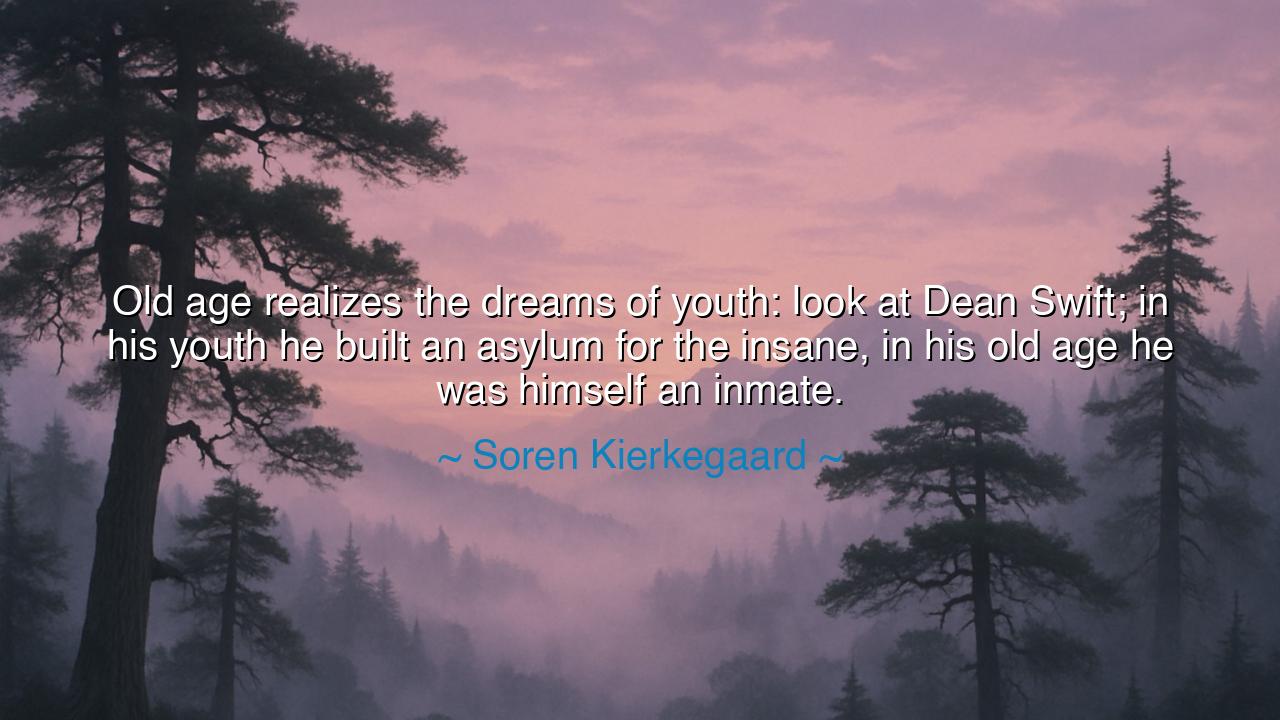
Old age realizes the dreams of youth: look at Dean Swift; in his
Old age realizes the dreams of youth: look at Dean Swift; in his youth he built an asylum for the insane, in his old age he was himself an inmate.






"Old age realizes the dreams of youth: look at Dean Swift; in his youth he built an asylum for the insane, in his old age he was himself an inmate." — Søren Kierkegaard
In this profound observation, Søren Kierkegaard speaks to the paradox of human existence—the inevitable way in which time, with its quiet passage, transforms our dreams, our ambitions, and our aspirations. The youthful idealist dreams of great deeds, of change, of progress, and of building a world of order and reason. Yet, with the march of time, those dreams may take a different form, often ironic, as we find that the very structures we sought to create or heal become the cages we must inhabit. Dean Swift, or Jonathan Swift, the famed satirist and author of Gulliver’s Travels, exemplifies this tragic irony. In his youth, he sought to reform the world, to build an asylum for the insane, a sanctuary for the lost and the broken. Yet in his old age, he became a prisoner of his own mind, suffering from mental illness and living the very fate he once sought to prevent.
This quote beckons us to reflect on the nature of youth and old age—two stages of life that, though separated by time, are intertwined by the flaws and ironies that come with the human condition. The youthful mind is often filled with idealism, a belief that one can fix the world, heal its wounds, and build a better future. But in the experience of old age, we see how time, that great equalizer, changes not only our physical bodies but the very nature of our dreams. What was once a vision of hope and ambition may, in the end, become a shadow of its former self—a dream now lived out in reversal, a tragic irony that shows us how little control we truly have over the course of our lives.
In the ancient world, this theme was explored by philosophers such as Heraclitus, who observed that the river of life is in constant flux, never the same from one moment to the next. His doctrine of change teaches us that nothing is permanent—not our bodies, not our minds, and certainly not our dreams. The same ideas were echoed by Socrates, who, though deeply concerned with virtue and the pursuit of wisdom, also spoke of the impermanence of all things. The wise person, he argued, does not cling to the idealism of youth but learns to accept the flow of life, with all its unexpected turns and reversals.
Consider the example of Alexander the Great, who in his youth dreamed of conquest, of building an empire that spanned the world. He was driven by a vision of greatness, of immortality through military might and political power. Yet, by the time of his untimely death at the age of 32, his dreams were left unfulfilled, and his empire was fractured, torn apart by his own ambitions. The very empire he sought to build became a source of destruction in his later years, a grim reminder that even the most powerful dreams can fade, lost to the ravages of time and fate.
Kierkegaard’s reference to Dean Swift is a reminder of this tragic cycle—the dreams of youth, filled with hope and idealism, are often realized in ways we could never have anticipated. In Swift’s case, he had built an institution designed to care for those deemed insane, yet he himself succumbed to a mental illness that would trap him within the very system he had once sought to improve. Old age brings with it a certain clarity—a realization that the world, and our place in it, is not so easily shaped. The dreams we have as young people may be noble and good, but they can also be fragile, easily undone by the passage of time or by forces we cannot control.
What, then, is the lesson we are to take from this? First, we must understand that youth is a time for idealism, for vision, for dreaming the impossible. It is a time to build and to create, to lay the foundations of a better world. But we must also recognize that old age brings a different perspective—a humbling acceptance of the limitations of our own power. The dreams we once held dear may not turn out as we had hoped, but that does not diminish their value. In fact, it is in old age that we learn the greatest lesson of all: that life itself, with all its irony and unexpected turns, is a work of art—imperfect, yet beautiful in its complexity.
Thus, we must cherish both youth and old age for what they offer. In youth, we are given the gift of vision, the fire that drives us to change the world. In old age, we are given the gift of reflection, the wisdom that comes from living long enough to see the consequences of our actions. Let us embrace both, with the understanding that life’s dreams are always in motion, forever evolving, and that the true measure of our journey is not whether we achieve all that we set out to do, but how we live with the knowledge of our impermanence, how we come to terms with the dreams we once held and the realities we must face. Time will shape us all, but it is how we respond to that shaping that defines our legacy.






AAdministratorAdministrator
Welcome, honored guests. Please leave a comment, we will respond soon